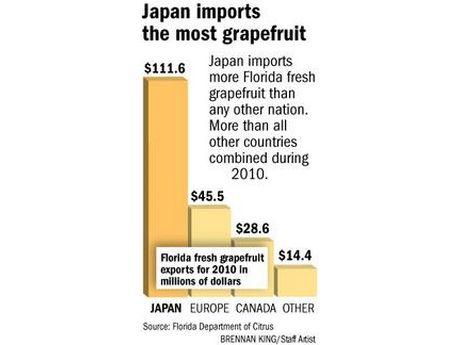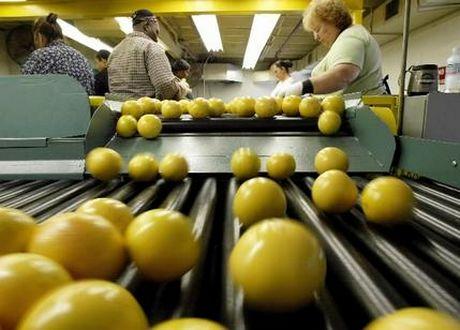The world's biggest consumers of Florida grapefruit are Japanese buyers, many of whom come here to make sure they receive the finest. "They visit in November to see what the season is going to do," said Paul Genke, director of sales and marketing for The Packers of Indian River in Fort Pierce. "We just had a group here in February." The ties are so close that many citrus folks in the region from Volusia to Palm Beach counties have their business cards printed in Japanese and English. So, when a 9.0 magnitude earthquake and tsunami hit Japan on Friday, the tragedy was felt thousands of miles away in the citrus groves of Indian River.

"It is really sad. It is a huge tragedy," said Doug Bournique, executive vice president of Indian River Citrus League in Vero Beach. "Japan's history with us is a very deep and rich history. They have been partners in our packinghouses and groves. They have been great partners. All of our major packinghouses ship there." It's too early to tell what the impact might be on shipments, but an estimated 2 million cartons of Florida grapefruit were headed to Japan on ships as of Friday, Florida citrus officials said. "Japan is our most important market," said Mike Yetter, international marketing director of the Florida Department of Citrus in Lakeland. "The Florida industry, at least the fresh grapefruit industry, would not be able to survive without the Japanese market." Hiroshi Ueda, originally from Osaka, Japan, manages USA Union International, a produce exporter in Vero Beach, where he has lived since 1989. Its parent company, Union Co. Ltd., is based in Tokyo. Their warehouse suffered some damage, but the employees were all safe.

Ueda worries that distribution channels could be shut down. "For grapefruit, it is still peak season," said Ueda, who added the company had about 400 perishable container loads at sea on Friday. Genke, of The Packers of Indian River, estimated his company has 40 containers on the way to Japan. February and March are his peak shipping months, he said. Maersk Line, an international shipper, reported the port facilities are in good working order and they expect to keep a normal schedule, Genke said. It takes about 25 days for fruit shipped out of Miami to reach ports in Japan, primarily Osaka and Tokyo. Japan, with less than half of the population of the U.S., consumes more grapefruit. In 2010, Florida shipped 285 million pounds of grapefruit valued at $111.6 million at the delivery point to Japan, according to the Florida Department of Citrus.

"It is really sad. It is a huge tragedy," said Doug Bournique, executive vice president of Indian River Citrus League in Vero Beach. "Japan's history with us is a very deep and rich history. They have been partners in our packinghouses and groves. They have been great partners. All of our major packinghouses ship there." It's too early to tell what the impact might be on shipments, but an estimated 2 million cartons of Florida grapefruit were headed to Japan on ships as of Friday, Florida citrus officials said. "Japan is our most important market," said Mike Yetter, international marketing director of the Florida Department of Citrus in Lakeland. "The Florida industry, at least the fresh grapefruit industry, would not be able to survive without the Japanese market." Hiroshi Ueda, originally from Osaka, Japan, manages USA Union International, a produce exporter in Vero Beach, where he has lived since 1989. Its parent company, Union Co. Ltd., is based in Tokyo. Their warehouse suffered some damage, but the employees were all safe.

Ueda worries that distribution channels could be shut down. "For grapefruit, it is still peak season," said Ueda, who added the company had about 400 perishable container loads at sea on Friday. Genke, of The Packers of Indian River, estimated his company has 40 containers on the way to Japan. February and March are his peak shipping months, he said. Maersk Line, an international shipper, reported the port facilities are in good working order and they expect to keep a normal schedule, Genke said. It takes about 25 days for fruit shipped out of Miami to reach ports in Japan, primarily Osaka and Tokyo. Japan, with less than half of the population of the U.S., consumes more grapefruit. In 2010, Florida shipped 285 million pounds of grapefruit valued at $111.6 million at the delivery point to Japan, according to the Florida Department of Citrus.
Related News
Photos
More>>trade
market
finance
- Crops and lifestyle withering in dry spell
- Former president of ZSTU on the list of the Top Ten Influential Educationists of
- Awarding ceremony of 2010 Sang Ma Trust Fund held at ZSTU
- The 2nd Intl. Conference on Advanced Textile Materials & Manufacturing
- BASF-YPC Scholarship Award Ceremony Held at CZU


